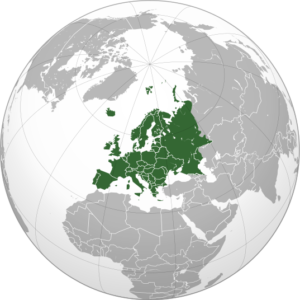The Ancient Roots of “Europe”
By: Javad Mofrad, Mythologist
Translation by WCHV
 The name Europe has been derived from the Greek word “Eury-ope” which meant having a long forehead, also referring to the “Phoenician Queen”. However, the original country that stretched from the North Sea to the Black Sea was also called the “Taurs” country which was also the place where the first wagon was invented. The ancient Indo-Iranian religious books of Avesta and Rigveda named that country, the Indo-Iranians original “chilly” (cold) country, by the name of Arya-varta. The names Khvaniratha (both meaning the land of magnificent wagon) and Aerina vaeja (the original land of wheels) were also used at different times. According to the Rigveda, it was said that they had hundred winters and hundred autumn in Aryavarta, and according to the Avesta´s, (Aerina vaeja) referring to the fact that winters lasted for a long time and at times for over nine months.
The name Europe has been derived from the Greek word “Eury-ope” which meant having a long forehead, also referring to the “Phoenician Queen”. However, the original country that stretched from the North Sea to the Black Sea was also called the “Taurs” country which was also the place where the first wagon was invented. The ancient Indo-Iranian religious books of Avesta and Rigveda named that country, the Indo-Iranians original “chilly” (cold) country, by the name of Arya-varta. The names Khvaniratha (both meaning the land of magnificent wagon) and Aerina vaeja (the original land of wheels) were also used at different times. According to the Rigveda, it was said that they had hundred winters and hundred autumn in Aryavarta, and according to the Avesta´s, (Aerina vaeja) referring to the fact that winters lasted for a long time and at times for over nine months.
According to the Pahlavi books the Aryans wandered from Khvaniratha to other lands under Paradhats time (the first legislators ‘ time). Herodotus tells us about the Paradhats home at the Skythes (Skythes that had lived in the Northern part of the Black Sea) by the name of Paralats. One of Paradhats was Takhmo-oropa (Europa’s hero), also called Takhmo-ratha (Chariot Country’s Hero). This displays that the name Oropa ([Eu]-rope) has been synonymous with (fine wheel and wagon).
According to Arthur Christensen, Avesta Takhmoropa is Skythian´s Arpoksais (wagon king). Herodotus tells us that the two people he had been referring to were Traspies (horse keepers, Russians) and Katyars (sword people, Magyars/Hungarian). The Greek mythical figures half horse and half human Centaurs (bulls-ruler), could have been derived from Russians (grooms, rus) and Taurs. From there, the goddess Europe myth roaring on a bull across the sea and her name have connection to Taurs and their goddess Iphigenia (the strong goddess), that is related to Avesta´s Ardvisvar-Anahita (the Virgin of the strong-flowing water). Phoenicians (or the “beautiful people”) were referred to as the Slavic people or the Veneds (the fine peoples) in Europe that Herodotus mentions under the name Aukhats (the fine families) as Lipoksais people. Lipoksais means “Fair the people’s king”. In the Avesta he was called Hao-shayangehe (the Fine Country´s King). As the Greeks had more contacts with the Phoenicians of the eastern coast of the Mediterranean Sea, they mistook them with Veneds.















